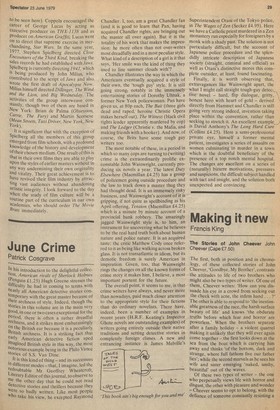June Crime
Patrick Cosgrave
I!1 his introduction to the delightful collection, American rivals of Sherlock Holmes (Penguin £1.25) Hugh Greene stresses the difficulty he had in coming to terms with nearly all Americandetective stories contemporary with the great master because of their archness of style. Indeed, though the stories in this volume are in the main very good, in one or two cases exceptional for the Period, there is often a rather dreadful archness, and it strikes most embarassingly On the British ear because it is a peculiarly British archness. It is a striking fact that early American detective fiction aped Imagined British style in this way, the most notorious example being in the Philo Vance stories of S.S. Van Dine. It is this kind of thing — and its successors in different modes — that, I imagine, led the redoubtable Mr Geoffrey Wheatcroft, Literary Editor of this journal, to observe to me the other day that he could not read detective stories and thrillers because they were so badly written. Like most people who take his view, he excepted Raymond Chandler. I, too, am a great Chandler fan (and it is good to learn that Pan, having acquired Chandler rights, are bringing out the master all over again). But it is the totality of his work that makes the impression: he more often than not over-writes most dreadfully and in a most peculiar style. What kind of a description of a girl is it that says, 'Her smile was the kind of thing they used to line summer clouds with'?
Chandler illustrates the way in which the Americans eventually acquired a style of their own, the 'tough guy' style. It is still going strong; notably in the immensely entertaining stories of Dorothy Uhnak, a former New York policewoman. Pan have given us, at 80p each, The Bait (three girls dead and raped, heroine Christie Opera stakes herself out), The Witness (black civil rights leader apparently murdered by cop) and The Ledger (Christie v. the Mafia, and making friends with a hooker). And now, of course, the Brits, have some tough guy writers too.
The most notable of these, in a period in which so many cops are turning to (writing) crime is the extraordinarily prolific exconstable John Wainwright, currently producing six novels a year. The latest Duty Elsewhere (Macmillan £4.25) has a group of policemen going outside procedure and the law to track down a master thug they had thought dead. It is an immensely risky business, and Wainwright's account of it is gripping, if not quite as spellbinding as his April offering, Tension (Macmillan £4.25) which is a minute by minute account of a provincial bank robbery. The amazingly jagged Wainwright style is, to him, an instrument for uncovering what he believes to be the real hard truth both about human nature and police nature. It is an acquired taste: the critic Matthew Cody once referred to it as being like walking across broken glass. It is not transatlantic in idiom, but its demotic freedom is surely American in inspiration. Given, too, that Wainwright rings the changes on all the known forms of crime story it makes him, I believe, a most important portent for the future.
The overall point, it seems to me, is that crime writers have always, and never more than nowadays, paid much closer attention to the appropriate style for their fictions than do ordinary novelists. There have, indeed, been a number of examples in recent years (H.R.F. Keating's Inspector Ghote novels are outstanding examples) of writers going entirely outside their native traditions and setting detective stories in completely foreign climes. A new and entrancing instance is James Melville's Superintendent Otani of the Tokyo police, in The Wages of Zen (Secker £4.95). Here we have a Catholic priest murdered in a Zen monastery run especially for foreigners by a monk with a shady past. The solution is not 'particularly difficult, but the account of Japanese police procedure and the splendidly intricate description of Japanese society (straight, criminal and official) as well as Otani's distinctive mores this complete outsider, at least, found fascinating.
Finally, it is worth observing that, extravagances like Wainwright apart, the what I might call straight tough-guy detective novel — hard, flip dialogue, gritty:\ honest hero with heart of gold — derived directly from Hammet and Chandler is still going very strong indeed, invention taking place within the convention, rather than seeking to stretch it. An excellent example,,,) is David Anthony's The Long Hard Cure (Collins £4.25). Here a semi-professional private eye, himself a former mental patient, investigates a series of assaults on women culminating in murder in a town which is the doubtful beneficiary of the presence of a top notch mental hospital. The changes are excellent on a series of (naturally) bizarre motivations, pressures and suspicions, the difficult subject handled with tact and insight, and the solution both unexpected and convincing.










































 Previous page
Previous page